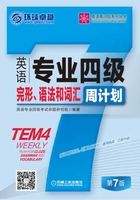
二、典型试题自测
PART Ⅲ LANGUAGE USAGE
There are twenty sentences in this section.Beneath each sentence there are four words or phrases marked A, B, C and D.Choose one word or phrase that best completes the sentence.
Mark your answers on ANSWER SHEET TWO.
11.Had Judy been more careful on the maths exam,she________much better results now.
A) would be getting B) could have got
C) must get D) would get
12.Men differ from animals________they can think and speak.
A) for which B) for that C) in that D) in which
13.________he wanted to go out with his friends at the weekend,he had to stay behind to finish his assignment.
A) Much though B) Much as C) As much D) Though much
14.Which of the following is INCORRECT?
A) All his lectures were boring.
B) Half his money has gone.
C) Her few friends are all fond of dancing.
D) He invited many his friends to the party.
15.What does “He wisely refused to spend his money” mean?
A) It was wise of him to refuse to spend his money.
B) He refused to spend his money in a wise manner.
C) He was short of money and didn't want to buy anything.
D) He refused,in a wise manner,to spend his money.
16.They stood chatting together as easily and naturally as________.
A) it could be B) could be C) it was D) was
17.The following are all correct responses to “Who told the news to the teacher?”EXCEPT________.
A) Jim did this.B) Jim did so.C) Jim did that.D) Jim did.
18.In his plays Shakespeare________his characters live through their language.
A) would make B) had made C) made D) makes
19.The square itself is five hundred yards wide,five times________the size of St.Peter's in Rome.
A)/B) that of C) which is D) of
20.Which of the following sentences expresses “probability”?
A) You must leave immediately.
B) You must be feeling rather tired.
C) You must be here by eight o'clock.
D) You must complete the reading assignment on time.
21.When he first started in university,he really felt at________with his major—economics.
A) shore B) bank C) ocean D) sea
22.On the road motorists should be aware of cyclists and be________towards them.
A) considerable B) considering C) considerate D) considered
23.The company has capitalized________the error of judgment made by its business competitor.
A) in B) over C) with D) on
24.Tim has failed three courses this semester,so he will have to________them next semester.
A) remake B) repeat C) reapply D) revise
25.Keep this reference book;it may come in________one day.
A) handy B) useful C) convenient D) helpful
26.She was once a young country wife with chickens in the backyard and a view of________-mountains behind the apple orchard.
A) Virginia blue hazy B) Virginia hazy blue
C) hazy blue Virginia D) blue hazy Virginia
27.I long to alleviate________-,but I cannot.
A) the evil B) evil C) evils D) an evil
28.She hired a lawyer to investigate,only to learn that Gabriel had removed her name from the deed.The infinitive verb phrase “only to learn” is used________-.
A) to express an intended purpose
B) to indicate a high degree of possibility
C) to reveal an undesirable consequence
D) to dramatize a stated fact
29.Which of the following italicized words DOES NOT carry the metaphorical meaning?
A) I wonder what's behind this change of plan.
B) Jim turned to speak to the person standing behind him.
C) This work should have been finished yesterday.I'm getting terribly behind.
D) I suppose I'm lucky because my parents were behind me all the way.
30.My mother was determined to help those in need and she would have been immensely proud of what has been achieved these last 20 years.The italicized part in the sentence expresses________-.
A) a hypothesis B) a suggestion C) a contradiction D) a surprise
PART Ⅳ CLOZE
Decide which of the words given in the box below would best complete the passage if inserted in the corresponding blank.The words can be used ONCE ONLY.Mark the letter for each word on ANSWER SHEET TWO.(2018年英语专业四级真题)
A.accompanies B.automatically C.couple D.goes
E.indebtedness F.kind G.manner H.mercifully
F.one J.obey K.renowned L.subscribe
M.unknown N.virtue O.widespread
A few years ago,a university professor tried a little experiment.He sent Christmas cards to a sample of perfect strangers.Although he expected some reaction,the response he received was amazing—holiday cards addressed to him came pouring back from the people who had never met nor heard of him.The great majority of those who returned a card never inquired into the identity of the 31 professor.They received his holiday greeting card,and they 32 sent one in return.This study shows the action of one of the most powerful weapons of influence around us—the rule for reciprocation.The rule says that we should try to repay,in 33,what another person has provided us.If a woman does us a favor,we should do her 34 in return;if a man sends a birthday present,we should remember his birthday with a gift of our own;if a 35 invites us to a party,we should be sure to invite them to one of ours.By 36 of the reciprocity rule,then,we are obliged to the future repayment of favors,gifts,invitations,and the like.So typical is it for 37 to accompany the receipt of such things that a term like “much obliged” has become a synonym for “thank you”,not only in the English language but in others as well.
The impressive aspect of the rule for reciprocation and the sense of obligation that 38 with it is its pervasiveness in human culture.It is so 39 that after intensive study,sociologists can report that there is no human society that does not 40 to the rule.